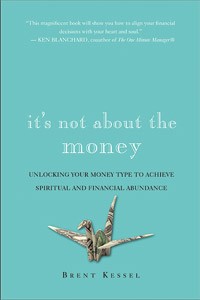
It’s Not About the Money: Unlock Your Money Type to Achieve Spiritual and Financial Abundance
Brent Kessel
San Francisco: Harper Collins, 2008
336 pp.; $24.95 (cloth)
FOR MANY OF us, money poses a most unsettling irony: The more we need money, the less there seems of it; the more money we have, the more we seem to need. Some of us have little money and seem quite content, while some of us have enormous wealth yet lead wretched lives. All of us to a great degree would like money to behave itself—to show up when we need it and not make too many demands. But money never seems to cooperate, leaving most of us feeling a bit edgy and concerned.
Now, we could go to a financial planner who could show us how to save more, invest smarter, and budget better—and no doubt, meeting with a disciplined financial planner can make all the difference in the world. But according to Brent Kessel, the unsettling irony we face is—as the title of his new book aptly proclaims—“not about the money” but about taming our “wanting mind” and developing spiritual freedom.
“The Wanting Mind is always craving an experience different from the one it currently has…[and] takes us out of the present moment in its attempts to make us happy in some better tomorrow,” Kessel points out. “And unless we inquire into the subtle and often hidden workings of the Wanting Mind—including whether its promises of happiness are actually true—we remain its slave and will likely spend a lifetime chasing images of freedom.”
For the skeptics among us, focusing on taming our “Wanting Mind” while the stock market crashes and our mortgage payments balloon may appear a bit naive at best. But rest assured, Kessel is no slouch when it comes to the practicality department. As president and cofounder of Abacus Wealth Partners, named one of the “top 250 wealth-management firms in the U.S.” by Bloomberg Wealth Manager, Kessel has the practical, hands-on experience to offer sound financial advice. But just as important is the fact that he has been practicing yoga and meditation for over fifteen years, giving him a unique perspective for bridging the seemingly disparate worlds of finance and spirituality. “This book…is not a financial how-to-book in spiritual clothing,” he writes. “Rather, it is a profound inner journey in which money is the primary focus…an intimate, practical resource for coming to know yourself through money.” And throughout this 336-page discourse packed with practical exercises and exemplary case studies, Kessel does just that: He leads us on an insightful journey of our inner life of money.
The core of the book revolves around the Eight Financial Archetypes—styles of relating to money that can be either expressed intelligently or repressed into anxiety and confusion. Using stories, practices, economic facts, and just plain good writing, Kessel outlines in detail these eight collective financial habitual patterns. The Guardian, always alert and inclined to fret about money, is the worrier within us. The Pleasure Seeker, a bit brash and fascinated with having fun, is our impulsive buyer. The Idealist stands aloof, above the distasteful discourse of commerce, seeking a higher vision, while the Saver struggles with impoverishment and seeks reassurance in abundance. The Star wants attention, and the Innocent sticks his head in the sand, hoping for the best. The Caretaker seeks harmony, often going overboard with generosity, while the Empire Builder is the part of us that thrives on power and innovation.
Kessel does a splendid job guiding us through these styles of relating to wealth to help us discover our “Core Story”—the conflict we feel between our vision of freedom and how we program ourselves for defense against pain and suffering. For Kessel, exploring and resolving this conflict is central if we want to cultivate spiritual health while we engage the daily challenges of livelihood and material wealth. And he outlines an excellent exercise to help bring this conflict into sharp personal focus for reflection.
Of course, Kessel ends his book with practical advice about managing diversified portfolios, unearthing hidden fees, and planning estates, lest he be accused of writing some Pollyanna New Age theory. And his financial advice is sound indeed.
But what makes It’s Not About the Money truly a refreshing addition to the spirituality and livelihood genre is how it helps the reader explore the powerful and deeply influential impact our emotions have on our daily challenge of making a living. Instead of taking the predictable road of trying to “solve” our money problems, Kessel skillfully reveals the natural wisdom of our feelings about money: we all possess an innate wisdom that, when properly cultivated, reveals how we can be spiritually free and confident in a world of material possessions.